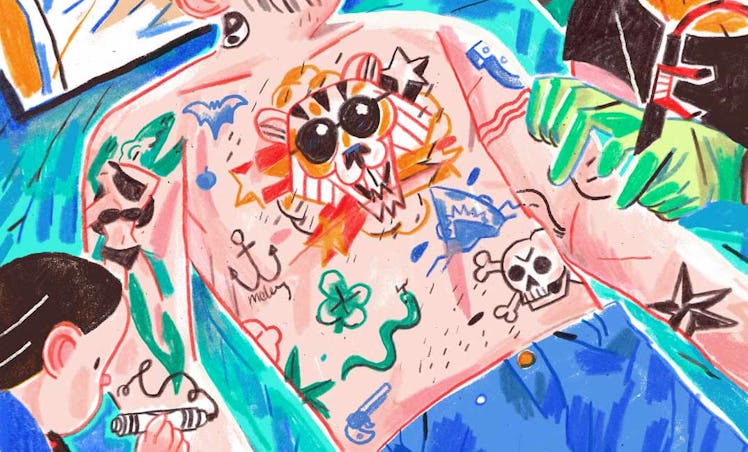What I Tell My Children About My Truly Awful Tattoos
When 'I was drunk and in college' isn't the right response.

When I was eighteen, I had an apartment in Florence, a shaved head, and a cockamamie theory that women communicated through their breasts and men communicated through their penises. Naturally, I decided one evening to get a pair of rudimentary images of the aforementioned theory tattooed on my skull. At the time, I was not considering having children, but, fifteen years later, those images are still — of course — on my skull and my kids have questions. They are also interested in why I have a pin-up girl on my shoulder, Serge Gainsbourg on my back, a weird tree house from a Silver Jews album on my torso and a “Mom” tattoo on my arm. Most of these tattoos I, to varying degrees, regret. I have other tattoos I do not regret. Explaining the former is a lot tougher than explaining the latter, but also, I’ve been shocked to discover, more rewarding.
This is not just a problem for me. In 2015, a Harris Poll study estimated that 47% of Millennials have at least one tattoo. (This isn’t counting the children who have tattoos.) Based on my experiences, that likely means that 40% of people regret or should regret either the placement, the subject, the technique or the existence of said their ink. Statistically, over 70 percent of these millions will become parents. And then, a few years later, they’ll have to account for themselves.
It is simple enough, though often embarrassing, to answer the what:
“Daddy, who is that lady on your arm?”
“Well, son, remember that Altoids ad from like 2003? No? Ok, well, it’s a lady.”
“Why is she on fire and not wearing any clothes?”
“A) She’s a demon and B) she did have clothes on, a red dress, but the ink fell out and now you can see her nipples. ”
“But why do you have that on your arm?”
That is a tougher query to which to respond. On the one hand, saying something to the effect “Your dad was an idiot” both undermines one’s credibility as not-an-idiot and is also not completely factual. There are hard-to-parse reasons beyond idiocy. On the other hand, standing by the tattoo is pretty lame as well. The pin-up girl, in particular, is troubling since I’m trying to raise woke-ass dudes who respect women and I find it impossible to defend my decision, years ago, to get a scantily clad woman depicted on my arm forever.
After ducking the question for a number of times, I settled on what I think is an appropriate response that teaches my sons something about me, something about the universe and something about tattoos. In addition, like the best responses to the queries of children, it is just a slightly tweaked version of what I tell myself. I say:
“People change. Who I am now is not who I was ten years ago, five years ago, yesterday, even. It is not a complete change. I am still, of course, your Daddy and I’ll always be your Daddy and I will always love you. But what I like to eat, what I like to wear, the things I like to do with my body, how I treat people, those have changed. When I was younger, I thought these tattoos were a good idea so I got them. I do not regret them now. However, I would not get them again. They are tattoos and so they are permanent. There is nothing to be ashamed about it. I was that. I am now this. So, instead of regarding them with shame or regret, I look at these tattoos as reminders of the guy I used to be and as a reminder that I can change.”
Often times, because I am not a pedantic monster who enjoys speaking over my children’s heads, I’ll elide the last part. But the essence of the answer remains the same. And it turns a potentially awkward conversation into one about the fundamental nature of self, about how it’s okay to change, how it’s okay to make mistakes and how to love one’s ever-changing self. And if my kids ever forget those, or if I do, I have reminders covering my skin forever and ever more.
This article was originally published on